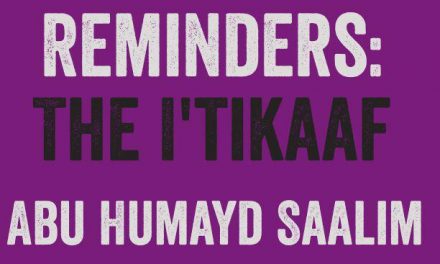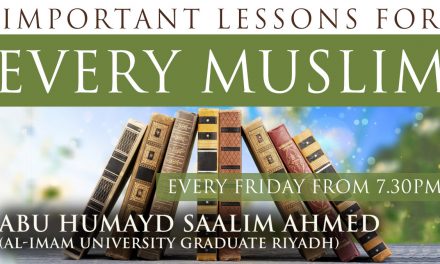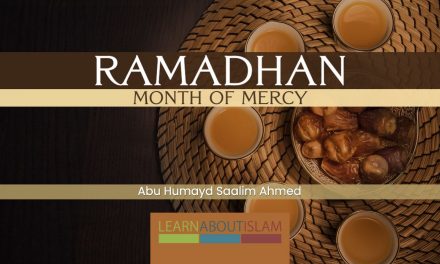The subject of this Surah (Al-Kafiroon) is the Tawheed of Allaah; likewise it is to disassociate oneself from shirk and misguidance. A reason for the revelation of this Surah is that the idle worshippers invited the Messenger to an agreement that he worships their Gods for a year, and that they in turn, worship his Lord for a year. This Surah was revealed to cut off that request.
This Surah is also known as Surah Al-Ikhlaas. The relevance of this Surah to the previous Surah (Al-kawthar), is that the previous Surah mentioned the command to worship Allaah sincerely; likewise this Surah sees the believers freeing themselves from those who oppose Tawheed.
The Prophet Sallallaahu Alayhi Wa Sallam would pray this Surah along with Surah Al-Ikhlaas in the Sunan of the Fajr prayer, the sunan after Maghrib prayer, in the Witr, and in the two units after making Tawaaf.
قُلۡ يَـٰٓأَيُّہَا ٱلۡڪَـٰفِرُونَ (١)
Say (O Muhammad (Sallallaahu Alayhi Wa Sallam) to these Mushrikûn and Kâfirûn): “O Al-Kâfirûn (disbelievers in Allâh, in His Oneness, in His Angels, in His Books, in His Messengers, in the Day of Resurrection, and in Al-Qadar)! (1)
قُلۡ
is a specific command, meaning “say!”
لَآ أَعۡبُدُ مَا تَعۡبُدُونَ (٢)
“I worship not that which you worship, (2)
وَلَآ أَنتُمۡ عَـٰبِدُونَ مَآ أَعۡبُدُ (٣)
“Nor will you worship that which I worship. (3)
وَلَآ أَنَا۟ عَابِدٌ۬ مَّا عَبَدتُّمۡ (٤)
“And I shall not worship that which you are worshipping. (4)
وَلَآ أَنتُمۡ عَـٰبِدُونَ مَآ أَعۡبُدُ (٥)
“Nor will you worship that which I worship. (5)
لَكُمۡ دِينُكُمۡ وَلِىَ دِينِ (٦)
“To you be your religion, and to me my religion (Islâmic Monotheism).” (6)
Allaah will protect His Messenger Sallallaahu Alayhi Wa Sallam from accepting the suggestion of the Mushrikeen (i.e. to worship other Gods). From this Surah we can also take a distinguish between Tawheed and Shirk.
In the name of Allah, the Beneficent, the Merciful
This Surah (An-Nasr) refers to the conquest of the Muslims, by way of which Islam spread in the Arabian peninsula, and by way of which Shirk and Kufr were destroyed. This Surah also consists of the death of the Prophet Sallallaahu Alayhi Wa Sallam drawing near. This Surah is named as such due to Allaah beginning with ‘Nasr’ in the first ayah.
The previous Surah mentioned the difference between the religion of the prophet and the religion of the kufar. This Surah shows an indication that the religion of the disbelievers will perish.
This Surah equates to ¼ of the Quran, as is narrated in a hadeeth. Shaykh Uthaymeen mentioned how a Surah may equate to 1/3 of the quran. For example if a person read a Surah three times he would get the reward of reading the whole Quran, and said, when it’s mentioned ‘it equates to’ it would be in reward but it’s not equal in every way, for example in terms of ruling. Likewise, if a person recited Surah Al-Ikhlaas three times in their prayer without reciting Surah Al-Fatiha, their prayer is invalid, even though it’s mentioned that reciting Surah Al-Ikhlaas three times is like reciting the whole Quran.
It was narrated that Umar Ibnul Khattaab used to take Abdullaah ibn Abbaas with him to his gatherings (while Abdullaah Ibn Abbaas was young) with the senior Companions that took part in the battle of Badr. When some of them saw this, they were uncomfortable with this. On an occasion, Umar Ibnul Khattaab brought him, and said (to them): What do you say regarding this Surah (An-Nasr)? Some of them said: The tafsir is that we should praise Allaah when the aid comes. Some stayed quiet. Then Umar asked Abdullah Ibn Abbaas: do you say as they say? He said: “No. This Surah was revealed because the life of the Prophet Sallallaahu Alayhi Wa Sallam is about to come to an end”. So Umar said: “I don’t know anything else except what you said”.
A general benefit we can take from this Surah (Nasr) is that we have glad tidings for the muslims, and a command to the Messenger Sallallaahu Alayhi Wa Sallam that he seeks forgiveness, and a command to the believers too that whenever the aid of Allaah comes we should praise him for that blessing to remain and increase.
we can categorise the paternal uncles of the Prophet Sallallaahu Alayhi Wa Sallam into three categories:
- Those who believed in him and did Jihaad with him (Hamza Ibn Muttalib & Abbaas Ibn Muttalib)
- Those who aided him and protected him, but remained upon shirk (Abu Taalib, whose name was Abdul Manaaf)
- Those who rejected him and were severe against him (Abu Lahab)
This Surah (Al-Masadd) was named as such due to its ending. This Surah is also known as Abi-Lahab.
تَبَّتۡ يَدَآ أَبِى لَهَبٍ۬ وَتَبَّ (١)
Perish the two hands of Abû Lahab (an uncle of the Prophet), and perish he![] (1)
تَبَّتۡ
The meaning here is ‘loss’.
مَآ أَغۡنَىٰ عَنۡهُ مَالُهُ ۥ وَمَا ڪَسَبَ (٢)
His wealth and his children will not benefit him! (2)
سَيَصۡلَىٰ نَارً۬ا ذَاتَ لَهَبٍ۬ (٣)
He will be burnt in a Fire of blazing flames! (3)
وَٱمۡرَأَتُهُ ۥ حَمَّالَةَ ٱلۡحَطَبِ (٤)
And his wife too, who carries wood (thorns of Sadan which she used to put on the way of the Prophet (Sallallaahu Alayhi Wa Sallam) , or use to slander him)[]. (4)
حَمَّا
The meaning here is that it will be done constantly.
فِى جِيدِهَا حَبۡلٌ۬ مِّن مَّسَدِۭ (٥)
In her neck is a twisted rope of Masad (palm fibre).[] (5)
The Prophet Sallallaahu Alayhi Wa Sallam mounted Uhud and gathered the Quraysh saying: if I told you there is an enemy close by, would you believe me? They would say yes. He said: “I am a warner to you of a severe punishment.” Abu Lahab said: “may your two hands be perished”. This is why this Surah was revealed.
This Surah is an explanation of how Allaah will destroy Abu Lahab and his plot. Likewise that his wealth and his children, and any disbelievers will not avail against the punishment of Allaah in any way. We also see the forbiddance of harming the believers.








